- Home
- L. Ron Hubbard
Writers of the Future, Volume 27 Page 2
Writers of the Future, Volume 27 Read online
Page 2
Most quarters, I find it extremely difficult to sort out those last eight pieces. Often, only a hair’s breadth separates the eight Finalists from the ten Semifinalists. As L. Ron Hubbard recognized, there is so much talent out there waiting to be discovered. New writers just need encouragement and a chance to be read. From my own experience as a winner in the Contest, I know that the existence of a professional market where new writers are only competing with each other is incredibly valuable. It keeps beginners writing when they might otherwise give up, encouraging them to produce a story every quarter so that they have something to enter. L. Ron Hubbard understood that every story we write teaches us new skills and helps us travel just a bit farther down the road toward publication. Producing fiction regularly is one of the defining characteristics of an author who will go on to develop a professional career.
So, if it’s that difficult, why do I say I have the best job in the world? It’s because my job involves making dreams come true. Writers must work so hard to learn their craft, but then, once they’ve achieved a professional standard with their prose, they discover they have to work even harder to get published. It’s not uncommon for them to give up just short of success. The Writers of the Future Contest was created to find talented newcomers and give them that much-needed boost to their careers at the point when they most need it.
Actually, I tried very hard not to have this job. When Algis Budrys first approached me to become First Reader for the Contest, I told him no. I was working full time as a teacher, taking care of my mom and grandparents, serving on the con committee of a literary science fiction convention, and, oh, yes, writing books and stories of my own.
But Algis would not take no for an answer. He suggested that I do the First Reading for just one quarter in the summer when I was not teaching. I agreed and was promptly swamped, spending many long hours learning how to distinguish which stories I should read all the way through. Then, at the end of the quarter, when he said he wanted me to be the permanent First Reader, I said no again. Definitely not! I simply did not have the time. He just smiled that wonderful mischievous smile of his and said, “I hope to change your mind.” Somehow, the boxes just kept coming to my house and I kept reading.
Algis knew what I would soon learn: helping new writers is addictive. A year later, I became Coordinating Judge when Algis retired. And, you know what? He was right. I love this job. I love finding great new stories each year and then sending them out into the world to be appreciated by fans everywhere. I love meeting and instructing the new writers who will write the books and stories that will become new classics we will all enjoy for years to come. I love having the chance to give back to the world at least some small measure of the joy that was given to me when I won in 1988.
The other best job in the world belongs to Ron Lindahn and Val Lakey Lindahn. They run the L. Ron Hubbard Illustrators of the Future Contest, which was created in 1988 as a companion to Writers of the Future, and teach the workshop that is part of the prize package. Again, the purpose is to find talented artists just on the edge of breaking out, recognize and commend their abilities, publish their creative efforts and instruct them on how to move up to the next level in their career.
Illustrator winners each illustrate one of the anthology’s stories, then are transported to the annual Illustrators’ workshop where Val and Ron Lindahn (and a number of our other Illustrators judges) dispense invaluable advice about how to develop and manage a career as an artist and keep inspiration coming. Unfortunately, as rare as it is, it is not enough to just have talent. Emerging artists must learn how to develop a portfolio and professional contacts, market their work and make it pay.
But Val and Ron and I would not have such fabulous jobs if it were not for all the talented folks out there honing their abilities as fiction writers and artists, waiting for their moment to step into the spotlight. Be assured that we are eager to read your stories and view your illustrations. We want to shake your hand on the stage as you receive your award and proceed to the next level in your career. We want to follow your success in the years to come.
So keep entering! I promise the best is just ahead.
The Unreachable
Voices of Ghosts
written by
Jeffrey Lyman
illustrated by
NICO PHOTOS
ABOUT THE AUTHOR
Jeff Lyman was born in Sault Sainte Marie, Michigan, on the Canadian border—a small town that averages 180 days a year below freezing and eleven feet of snow. With little else to do during the winter, Jeff learned to read early. This helped him overcome tremendous culture shock when he moved to the outskirts of New York City at the age of seven. He doesn’t remember the transition from Dr. Seuss to science fiction, but it happened early.
Though he has written throughout his life, Jeff finally decided to take writing seriously in 2004 by attending Odyssey, The Fantasy Writing Workshop. It transformed his life and vaulted his meager skills a thousandfold. Since then he has been published numerous times in small press anthologies and has assisted in editing the Bad-Ass Faeries series of anthologies, as well as others. This submission to Writers of the Future is his first professional sale.
Jeff graduated from Princeton University in 1994 with a degree in aerospace engineering. He currently lives and works near New York City as a mechanical engineer and loves climbing and burrowing into the forgotten crevices of the city.
ABOUT THE ILLUSTRATOR
Nico was born and raised in sunny Los Angeles and spent most of his time in his jungle-esque front yard. Nico likes to think of this front yard as the beginning of his artistic career. It was an incredible place where danger lurked around every corner and you never knew what magnificent treasures were to be found. That yard was the spark which ignited his imagination.
At the age of ten, Nico discovered Japanese anime through a promotional videotape (you may remember videotapes . . . ?)
that somehow ended up in his mailbox. The tape was a Pokémon episode. That did it. He was hooked, which resulted in all kinds of personal problems (e.g., Pikachu-shaped birthday cakes and approximately 24,849 hours of life wasted on his Game Boy) but it also resulted in a passion for drawing, which, fed by his wonderfully supportive parents, soon became a craze, and subsequently a mania. He recalls spending seven or eight hours a day, seven days a week drawing on his summer breaks, and about 98.6% of all his class time being consumed with doodles.
His parents, recognizing his mania for what it was, decided that the best way to handle it was to channel it. He was enrolled in art classes and received how-to books for Christmas and was generally deluged with artistic encouragement. Then he met Ken Hellenbolt. Ken worked for Hanna-Barbera in the old days and would become a friend and artistic mentor. That’s when Nico’s drawing ability really skyrocketed. His art insanity reached a new peak when Ken introduced him to the work of Frank Frazetta. Frazetta’s art touched Nico like none had before and right then he knew that’s what he wanted to do.
The Unreachable
Voices of Ghosts
Max Getty’s sail-ship passed the official outer edge of the Kuiper Belt at a tremendous velocity, sailing over the Kuiper Cliff where the density of asteroids and planetoids plummeted. Out here, the sun’s influence was tenuous. Not that he noticed a difference or could tell that he was moving at all. Still, it was a milestone for which he had been waiting for fifteen years in his little two-room ship. He toasted himself with a tiny sip of fifteen-year-old Scotch (when purchased), now thirty years old, and went back to routine.
“Trap status,” he said to the voice inputs, swiveling on his chair to look back at the sun. It was a bright star, and the computer had centered it in the rear screen so he could find it easily. It made him feel nostalgic, though he had bid it good riddance when he set out from near-Earth orbit.
“Trap status optimal.” Data
scrolled down Screen #4 on his left.
Around the Odysseus, an aura of twelve tethers extended, three kilometers of fishing line out to Aeolus traps bound to each end. Magnetic fields held the powerful traps open, but like mousetraps, they would clap shut at the slightest perturbation.
Max had deployed them years ago, still deep in the Kuiper Belt and long before they could possibly catch something. He wasn’t really sure why he had bothered since he didn’t want to catch anything.
He clicked a couple of toggles and reefed the sails slightly. The galactic wind fought the solar wind and eddies were warping his trajectory. Not that he really had a destination. There were no destinations out here. You sailed until you died or until you got lucky and caught a baby black hole.
The incoming message signal beeped twice. Max had his comm unit set on passive receipt, since he didn’t want to talk.
A faint voice rasped from the speakers, as much white noise as speech. “Jennifer Gates here, signing off. This’ll be my last general transmission to all you fishermen and women. I didn’t have the luck of it, but here’s raising a glass to you all. May you find a black hole in your nets and the sun at your face. I’ll stay on for a month or two more, so, Michael Dunkirk and Oruna Miguel, keep talking to me.”
Max checked the data log. The message had originated hours ago from very far out. Jennifer Gates was probably crying with her friends right now, contemplating suicide. He grabbed an empty shot glass with an image of the Hawaiian Islands on the side and raised it to the viewscreen in front of him. “For Jennifer Gates and all the cold stars shining. Let your eyes forever turn to the sun, your life to the solar wind.”
He looked down at the empty shot glass. He hated the goodbye messages. A few came in every month, a constant reminder that the odds of anyone catching a baby black hole and turning their ship around were maybe one in ten.
He called up a tracking screen that showed the fishermen and women in this sector of the void. Hundreds and hundreds, their positions continuously tracked as their messages arrived. He located the bright dot that was Jennifer Gates. Her ship was clearly past the nebulous radius-of-no-return, so she had already sailed for months beyond the end of her road. She didn’t have to kill herself. She could keep heading out until she died of old age, but who wanted that? Suicide was the norm.
Beyond Gates’ bright dot sailed thousands of coffins, ships that had gone silent but not cold, still heading out. Their computers routinely broadcast their coordinates and the Ident numbers of fishers gone down to sea. At a radius very far out, even these began to wink out as their generators failed. A bare dusting, those with the most expensive isotope generators, sparkled beyond the dark line. Those faintest signals took weeks to drift back to the living fishers from coffins hundreds of years old.
Max sometimes gazed for hours at the constellation of sail-ships, both the active ones and the coffins. It was a wonder. So many years’ worth of desperate people, so many failed dreams. He had pinged some of the coffins when he was still in the Kuiper Belt, requesting data packets of long-vanished conversations. They arrived, and he would sit in his chair pedaling his bicycle for exercise and listen to dead fishers talking about pretty much the same things that living fishers talked about now.
Political parties had changed, or conflicts or failures that had caused the despair necessary for becoming a fisher, but it was familiar. The corporations fed on that despair to fetch baby black holes for their stardrives. Why else sell the sail-ships so cheap? Anyone could go out into the void who wanted to go, so long as they offered their patron corporation first-right-of-black-hole-purchase at a set price.
Max hadn’t fallen for that trap. He had purchased his own sail-ship outright with a powerful generator, a large hydroponic module and a powerful high-gain antenna so he could follow broadcasts from home. He even had two rooms, unlike the corporate giveaways with their single-chamber ships. He couldn’t imagine being trapped in such a shoebox. The minimum trip was thirty years, fifteen out past the Kuiper Belt and fifteen back in if you happened to stumble on a baby black hole right over the Kuiper Cliff.
Well-wishing messages streamed into his receiver as the collective community bid farewell to Jennifer Gates.
“Halt all feeds,” Max said.
His sail-ship fell silent save for the squeak of the bicycle pedals under his feet and his ragged breathing. He hated silence, even though he never talked to anyone, because then his ship felt like what it was. If he wasn’t listening to idle fisher-chatter, he played music or 3-D immersion feeds his antenna picked up from home. He got the latest that Hollywood, Bollywood and France had to offer.
“Isolate the Kingfisher’s signal and play,” he said, not wanting to watch a movie or newsfeed right now.
Bartelmeus Jones, called the Kingfisher by pretty much everyone, stood in direct contrast to Jennifer Gates. He was the most distant living fisher. He was ninety-seven years old and had been outbound for seventy-one of those years.
He joked that he was too chicken to kill himself, but Max knew that couldn’t be the whole truth. Everyone out here had months of despair. Months so black that even the greatest optimists and greatest cowards found their fingers on the link to disable their CO2 scrubbers. Hell, some folks killed themselves before they even reached the Kuiper Cliff, and only their coffins coasted out into the void. What a waste. And yet the Kingfisher rode on.
He clearly enjoyed his status as the patriarch of the scattered fishers. He liked giving advice and telling stories of victories and losses. He had known a lot of the long-silent voices from the coffins and had a great many stories to tell. The void wasn’t as empty as it seemed, and seventy-one years was enough to accumulate tales of wonder.
Max hadn’t liked him much in the early years after he passed Pluto. The Kingfisher’s inability to catch a black hole or kill himself felt too much like failure, only with a running commentary. Bartelmeus was always “on,” always talking. He was the white noise of deep space. But he had a way of growing on you and now Max tuned in to him often.
“ . . . flared out his sails as far as they would go, and Rebecca Solange furled hers completely. It took him four and a half years to reach her, but woo wee, that was a union.”
Max flicked off the feed. He’d heard variants of this one many times. Jack Kwon and Miriam Solange, out past the radius-of-no-return and very much in love, had jettisoned their Aeolus traps and linked ships, sailing outbound together before fighting and ending in a murder-suicide nine years later. That was before the sail-ships were outfitted with easy linking ports, so it was the first time anyone had tried it. It was common now for fishers to link ships. Well, common as in one every few years. It took a hell of a lot to overtake one another in the vastness of the void.
Max had a bunch of Kingfisher recordings on his data banks; many were variants of one another. He preferred the “seldom” stories—the ones told rarely or maybe only once. He had pinged a lot of deep coffins over the years, looking for ancient Kingfisher broadcasts stored in their fading memory. He’d even pinged the Kwon-Solange coffin, which was moving ever outward in union, but that one was dark. Kwon had recorded a number of rambling monologues before he killed himself.
Max unstrapped himself from his bicycle and puttered around the small cabin for a few hours, checking all systems. The generator was producing power optimally, and would for many years. He checked his wife’s Swedish ivy plant, which had grown into a spider web of vines and branches over the past fifteen years. The nutrient drip at the main flowerpot was doing fine, as well as fifteen other drips at far-flung roots where the plant had attached itself to walls and ceilings.
Max hesitated over the hibernation box. Maybe it was time to go to sleep for a month or two, recharge the batteries. Most fishers lived this way, hopscotching through life. Four weeks awake, four to eight weeks asleep. Max didn’t follow that pattern so much, both because
he didn’t mind being awake in the ship and because he knew from experience that he needed a minimum of three weeks to really shake off the effects of hibernation-torpor. Just when he was starting to feel his best, he was expected to jump back into the box.
He eased himself into the container, a tight fit under the best of circumstances, and started the cycle. In the moment that sleep took him, he felt like he was drowning. It happened every time.
The years passed in comfortable routine: awake/asleep, repairs on systems, lurking and watching the constant video chatter from so many new and old fishers. A few times a month there were going-away parties and eulogies; some months were worse than others. Every other month or so someone caught a baby black hole and there was much jealous rejoicing; some months were luckier than others. Max maintained his Aeolus traps, figuring if he was one of the lucky ones, he’d give it away. That’d make a story for the Kingfisher’s arsenal.
Then, six years into his fishing run across the void, Max ran into the first major mechanical failure that he couldn’t fix on his own. The computer yanked him out of hibernation early, alarm lights flashing.
Groaning, he sat on the edge of the box for several minutes trying to massage feeling back into his numb left side. He felt very ill, worse than usual. The drugs hadn’t had a chance to metabolize. Then he shoved over to the alarm console and stopped the flashing lights.
The water reclamation unit was failing. It was working at about forty percent, chugging unhealthily. There was an annoying buzz coming from below the floor.
He unscrewed the deck plate over the unit and saw that the holding tank was about half filled with wastewater. Humidity levels were increasing in the cabin. He shut the system down and pulled the filters with his working right hand. They seemed fairly clean. They were supposed to be self-cleaning. He pushed them back into place, then replaced the belts on the transfer pumps because the old ones looked worn. He turned the system on again, and it buzzed just as loudly as before, maybe worse.

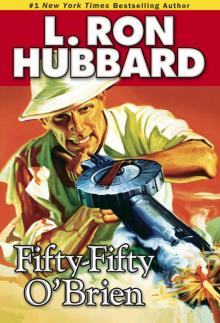 Fifty-Fifty O'Brien
Fifty-Fifty O'Brien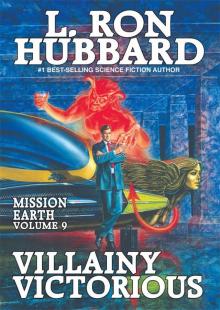 Villainy Victorious
Villainy Victorious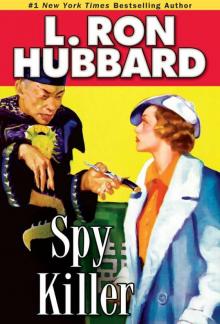 Spy Killer
Spy Killer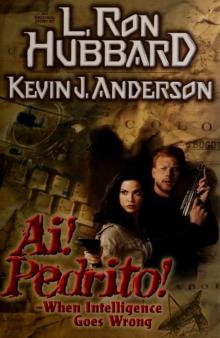 Ai! Pedrito!: When Intelligence Goes Wrong
Ai! Pedrito!: When Intelligence Goes Wrong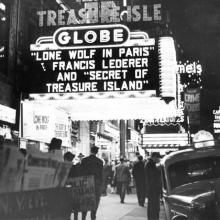 The Dangerous Dimension
The Dangerous Dimension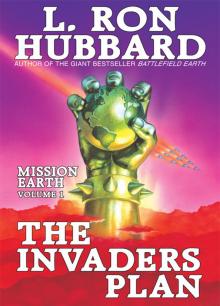 Mission Earth Volume 1: The Invaders Plan
Mission Earth Volume 1: The Invaders Plan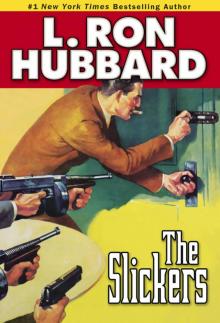 The Slickers
The Slickers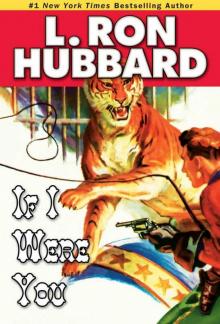 If I Were You
If I Were You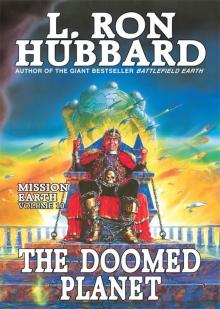 The Doomed Planet
The Doomed Planet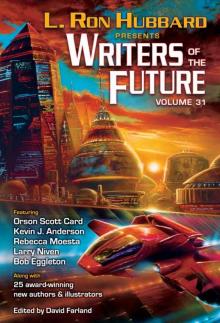 Writers of the Future Volume 31
Writers of the Future Volume 31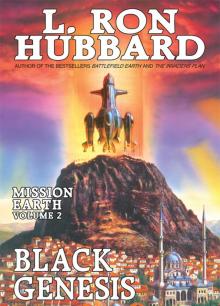 Mission Earth Volume 2: Black Genesis
Mission Earth Volume 2: Black Genesis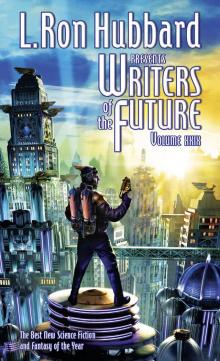 Writers of the Future: 29
Writers of the Future: 29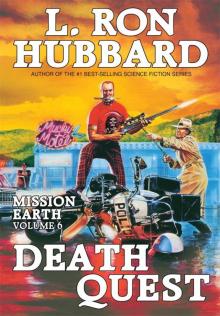 Death Quest
Death Quest The Enemy Within
The Enemy Within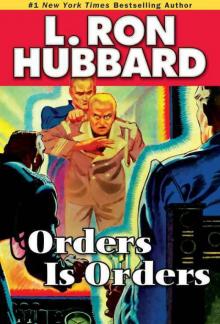 Orders Is Orders
Orders Is Orders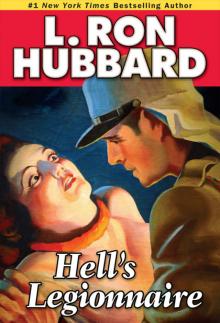 Hell's Legionnaire
Hell's Legionnaire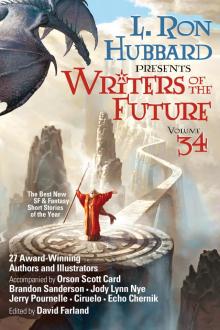 L. Ron Hubbard Presents Writers of the Future 34
L. Ron Hubbard Presents Writers of the Future 34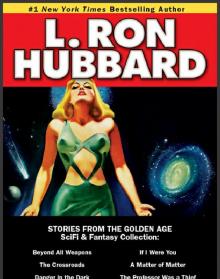 The Scifi & Fantasy Collection
The Scifi & Fantasy Collection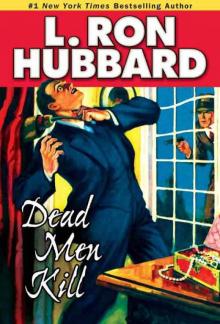 Dead Men Kill
Dead Men Kill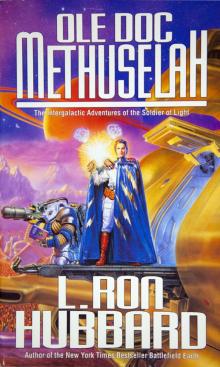 Ole Doc Methuselah: The Intergalactic Adventures of the Soldier of Light
Ole Doc Methuselah: The Intergalactic Adventures of the Soldier of Light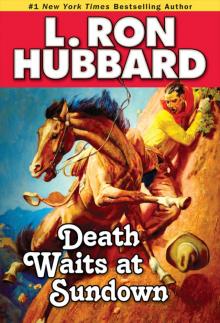 Shadows From Boot Hill
Shadows From Boot Hill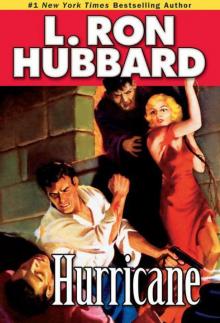 Hurricane
Hurricane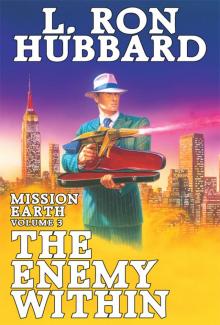 Mission Earth Volume 3: The Enemy Within
Mission Earth Volume 3: The Enemy Within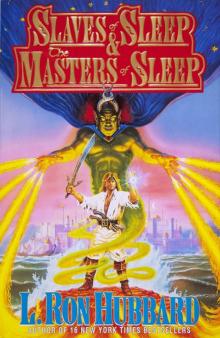 Slaves of Sleep & the Masters of Sleep
Slaves of Sleep & the Masters of Sleep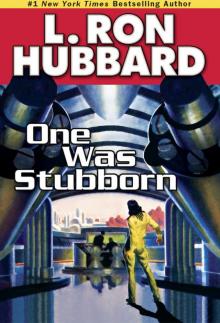 One Was Stubborn
One Was Stubborn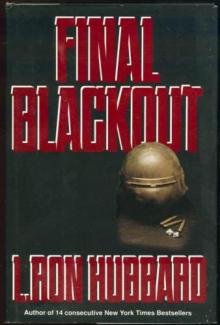 Final Blackout: A Futuristic War Novel
Final Blackout: A Futuristic War Novel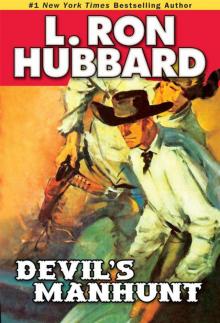 Devil's Manhunt
Devil's Manhunt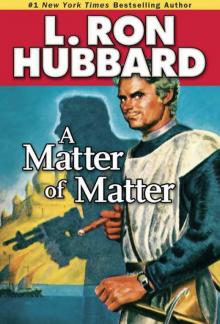 A Matter of Matter
A Matter of Matter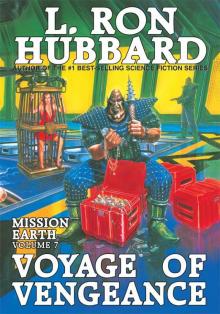 Voyage of Vengeance
Voyage of Vengeance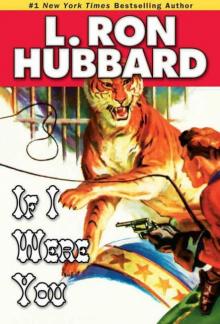 If I Were You (Science Fiction & Fantasy Short Stories Collection)
If I Were You (Science Fiction & Fantasy Short Stories Collection)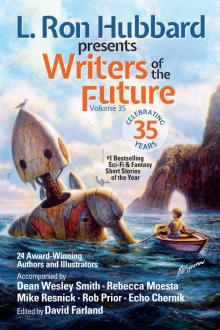 L. Ron Hubbard Presents Writers of the Future Volume 35
L. Ron Hubbard Presents Writers of the Future Volume 35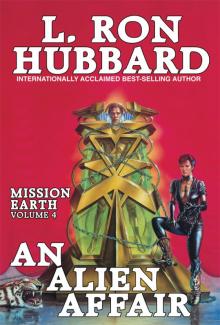 Mission Earth Volume 4: An Alien Affair
Mission Earth Volume 4: An Alien Affair Black Genesis
Black Genesis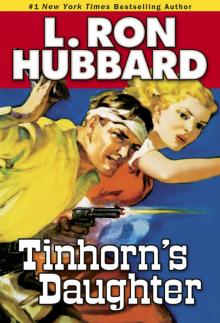 Tinhorn's Daughter
Tinhorn's Daughter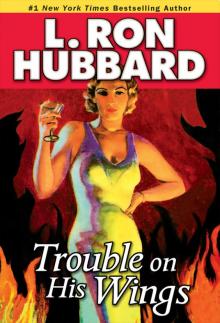 Trouble on His Wings
Trouble on His Wings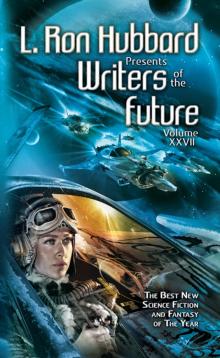 Writers of the Future Volume 27: The Best New Science Fiction and Fantasy of the Year
Writers of the Future Volume 27: The Best New Science Fiction and Fantasy of the Year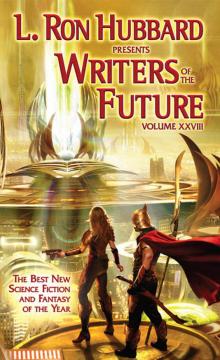 Writers of the Future Volume 28: The Best New Science Fiction and Fantasy of the Year
Writers of the Future Volume 28: The Best New Science Fiction and Fantasy of the Year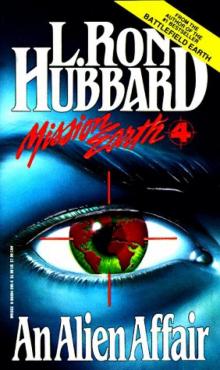 An Alien Affair
An Alien Affair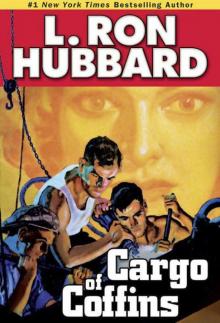 Cargo of Coffins
Cargo of Coffins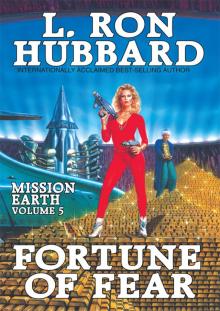 Mission Earth Volume 5: Fortune of Fear
Mission Earth Volume 5: Fortune of Fear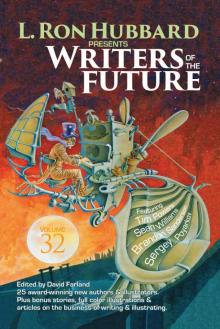 Writers of the Future 32 Science Fiction & Fantasy Anthology
Writers of the Future 32 Science Fiction & Fantasy Anthology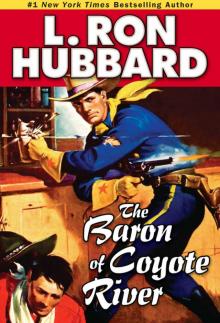 The Baron of Coyote River
The Baron of Coyote River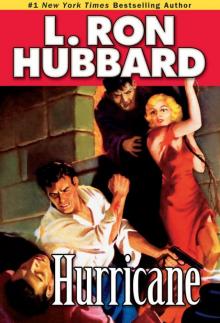 Hurricane (Stories From the Golden Age)
Hurricane (Stories From the Golden Age)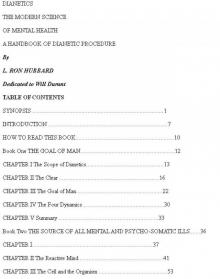 Dianetics: The Modern Science of Mental Health
Dianetics: The Modern Science of Mental Health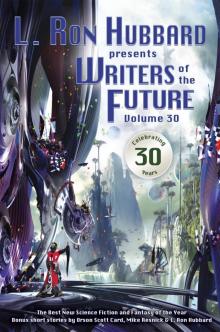 Writers of the Future, Volume 30
Writers of the Future, Volume 30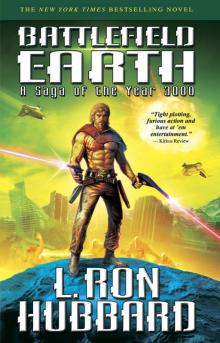 Battlefield Earth: A Saga of the Year 3000
Battlefield Earth: A Saga of the Year 3000 Fear
Fear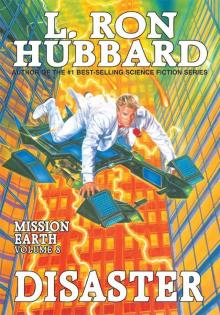 Disaster
Disaster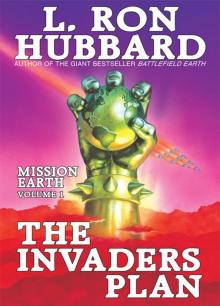 Invaders Plan, The: Mission Earth Volume 1
Invaders Plan, The: Mission Earth Volume 1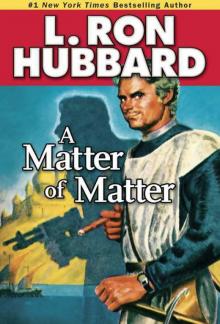 A Matter of Matter (Stories from the Golden Age)
A Matter of Matter (Stories from the Golden Age)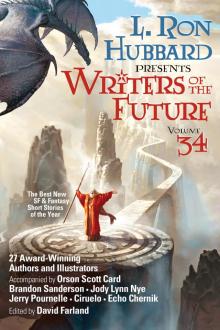 Writers of the Future Volume 34
Writers of the Future Volume 34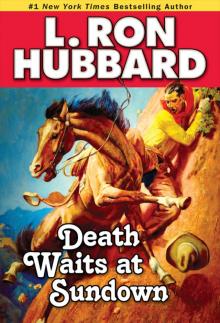 Death Waits at Sundown
Death Waits at Sundown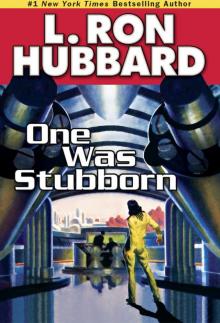 One Was Stubbron
One Was Stubbron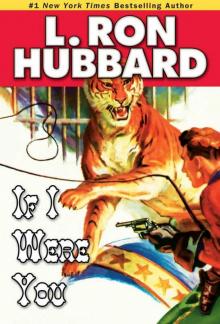 If I Were You (Stories from the Golden Age)
If I Were You (Stories from the Golden Age)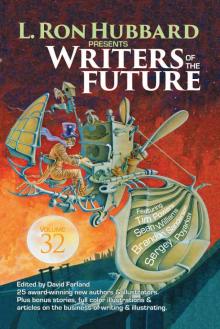 Writers of the Future 32 Science Fiction & Fantasy Anthology (L. Ron Hubbard Presents Writers of the Future)
Writers of the Future 32 Science Fiction & Fantasy Anthology (L. Ron Hubbard Presents Writers of the Future)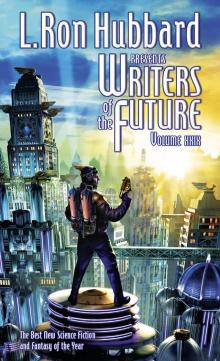 Writers of the Future, Volume 29
Writers of the Future, Volume 29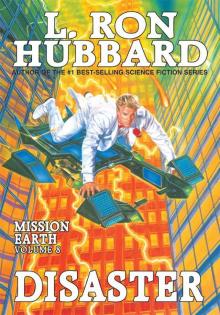 Mission Earth Volume 8: Disaster
Mission Earth Volume 8: Disaster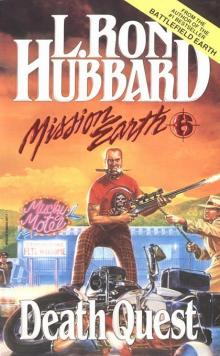 Mission Earth 6: Death Quest
Mission Earth 6: Death Quest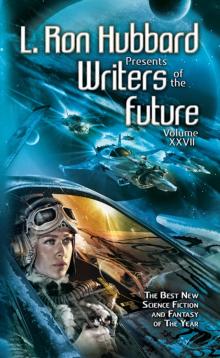 Writers of the Future, Volume 27
Writers of the Future, Volume 27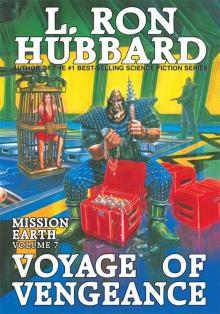 Mission Earth Volume 7: Voyage of Vengeance
Mission Earth Volume 7: Voyage of Vengeance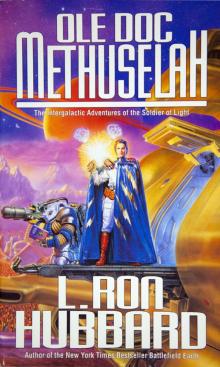 Ole Doc Methuselah
Ole Doc Methuselah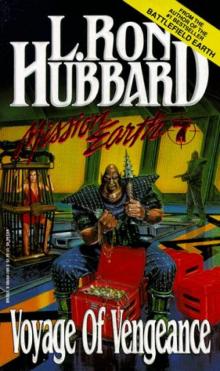 Mission Earth 07: Voyage of Vengeance
Mission Earth 07: Voyage of Vengeance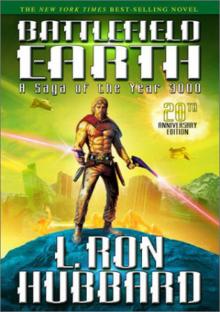 Battlefield Earth
Battlefield Earth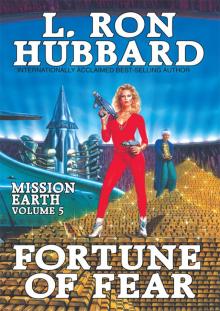 Fortune of Fear
Fortune of Fear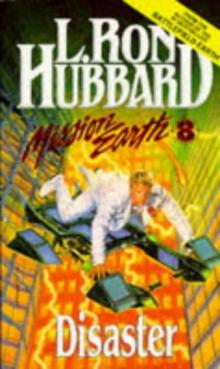 Mission Earth 8: Disaster
Mission Earth 8: Disaster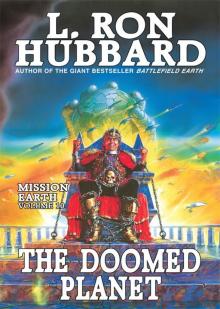 Mission Earth Volume 10: The Doomed Planet
Mission Earth Volume 10: The Doomed Planet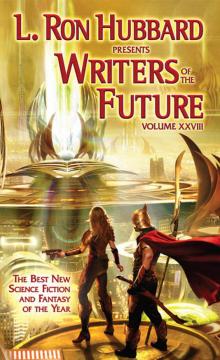 Writers of the Future, Volume 28
Writers of the Future, Volume 28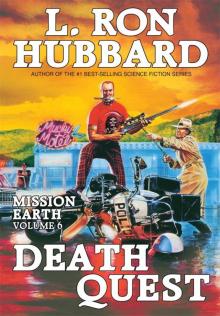 Mission Earth Volume 6: Death Quest
Mission Earth Volume 6: Death Quest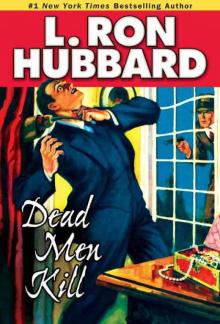 Dead Men Kill (Stories from the Golden Age)
Dead Men Kill (Stories from the Golden Age)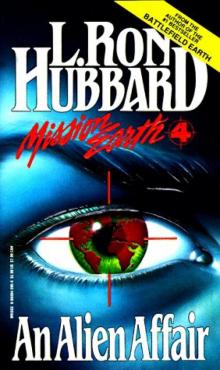 Mission Earth 4: An Alien Affair
Mission Earth 4: An Alien Affair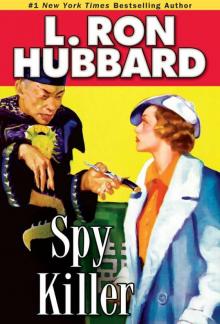 Spy Killer (Stories from the Golden Age)
Spy Killer (Stories from the Golden Age)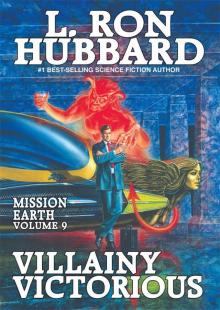 Mission Earth Volume 9: Villainy Victorious
Mission Earth Volume 9: Villainy Victorious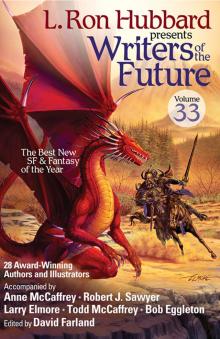 L. Ron Hubbard Presents Writers of the Future, Volume 33
L. Ron Hubbard Presents Writers of the Future, Volume 33